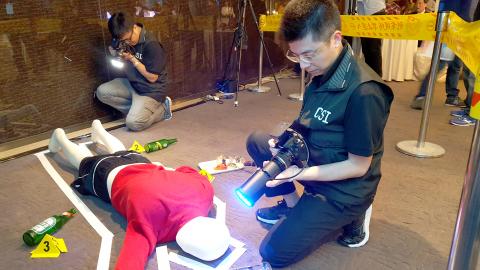Forensic scientist Henry Lee (李昌鈺) and National Applied Research Laboratories (NARL) on Tuesday unveiled a forensic camera that can detect injuries and evidence beneath the skin that are invisible to the naked eye.
One of the most difficult aspects of collecting evidence at crime scenes is detecting invisible injuries, as it takes time for a bruise to develop, and the window between the onset of a violent incident and the detection of noticeable injuries is a period when forensic medical examination is inadequate.
NARL developed imaging technology able to detect ruptured blood vessels and blood extravasation beneath the skin by measuring blood oxygen levels with a blue and ultraviolet dual-light device, NARL researcher Mark Lin (林宇軒) said.

Photo: Chen Wei-han, Taipei Times
“Blood contains hemoglobin and bilirubin, which turn fluorescent when exposed to blue and ultraviolet lights. The light emitted by hemoglobin and bilirubin exhibits different colors depending on blood-oxygen levels,” Lin said.
“Lower blood oxygenation occurs when blood vessels are ruptured and blood congeals, so forensic scientists can determine the scope and severity of injuries beneath the skin with images taken by the device,” Lin said.
“Traditionally, investigators rely on experience and the colors of a bruise — if there is one — to determine when an injury was inflicted, but now they can estimate the time of injury with more precision by measuring blood oxygen levels,” Lee said.
The device can be used to help victims of domestic violence and sexual assaults in which injuries might be less apparent, Lee said.
The forensic camera can also take pictures of fingerprints and body fluids, and the data can then be instantly transmitted to a crime laboratory anywhere in the world, enabling data-matching to be undertaken and senior investigators to direct crime-scene investigations remotely.
Lee demonstrated a remote crime-scene investigation with the forensic camera, as he instructed two rookie investigators on what evidence to collect and where to collect it via a computer screen, with images of the scene and fingerprints displayed in real time.
That could help understaffed police units to process a crime scene in a professional manner, he said.
“Such technology can take the crime lab to the crime scene, instead of the other way around, as we are used to. The technology can also be used to fight terrorism on a global level, as images taken at a certain location can be immediately analyzed by experts around the world,” Lee said.

Alain Robert, known as the "French Spider-Man," praised Alex Honnold as exceptionally well-prepared after the US climber completed a free solo ascent of Taipei 101 yesterday. Robert said Honnold's ascent of the 508m-tall skyscraper in just more than one-and-a-half hours without using safety ropes or equipment was a remarkable achievement. "This is my life," he said in an interview conducted in French, adding that he liked the feeling of being "on the edge of danger." The 63-year-old Frenchman climbed Taipei 101 using ropes in December 2004, taking about four hours to reach the top. On a one-to-10 scale of difficulty, Robert said Taipei 101

A preclearance service to facilitate entry for people traveling to select airports in Japan would be available from Thursday next week to Feb. 25 at Taiwan Taoyuan International Airport, Taoyuan International Airport Corp (TIAC) said on Tuesday. The service was first made available to Taiwanese travelers throughout the winter vacation of 2024 and during the Lunar New Year holiday. In addition to flights to the Japanese cities of Hakodate, Asahikawa, Akita, Sendai, Niigata, Okayama, Takamatsu, Kumamoto and Kagoshima, the service would be available to travelers to Kobe and Oita. The service can be accessed by passengers of 15 flight routes operated by

Taiwanese and US defense groups are collaborating to introduce deployable, semi-autonomous manufacturing systems for drones and components in a boost to the nation’s supply chain resilience. Taiwan’s G-Tech Optroelectronics Corp subsidiary GTOC and the US’ Aerkomm Inc on Friday announced an agreement with fellow US-based Firestorm Lab to adopt the latter’s xCell, a technology featuring 3D printers fitted in 6.1m container units. The systems enable aerial platforms and parts to be produced in high volumes from dispersed nodes capable of rapid redeployment, to minimize the risk of enemy strikes and to meet field requirements, they said. Firestorm chief technology officer Ian Muceus said

MORE FALL: An investigation into one of Xi’s key cronies, part of a broader ‘anti-corruption’ drive, indicates that he might have a deep distrust in the military, an expert said China’s latest military purge underscores systemic risks in its shift from collective leadership to sole rule under Chinese President Xi Jinping (習近平), and could disrupt its chain of command and military capabilities, a national security official said yesterday. If decisionmaking within the Chinese Communist Party has become “irrational” under one-man rule, the Taiwan Strait and the regional situation must be approached with extreme caution, given unforeseen risks, they added. The anonymous official made the remarks as China’s Central Military Commission Vice Chairman Zhang Youxia (張又俠) and Joint Staff Department Chief of Staff Liu Zhenli (劉振立) were reportedly being investigated for suspected “serious